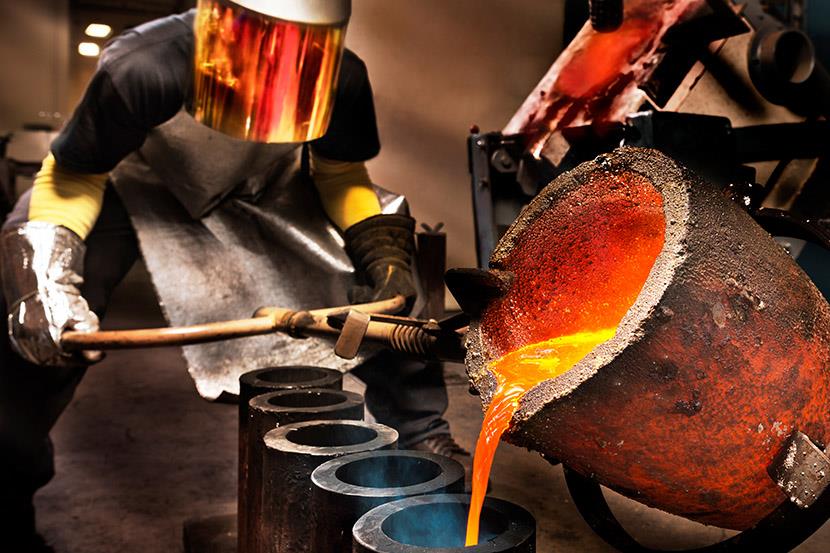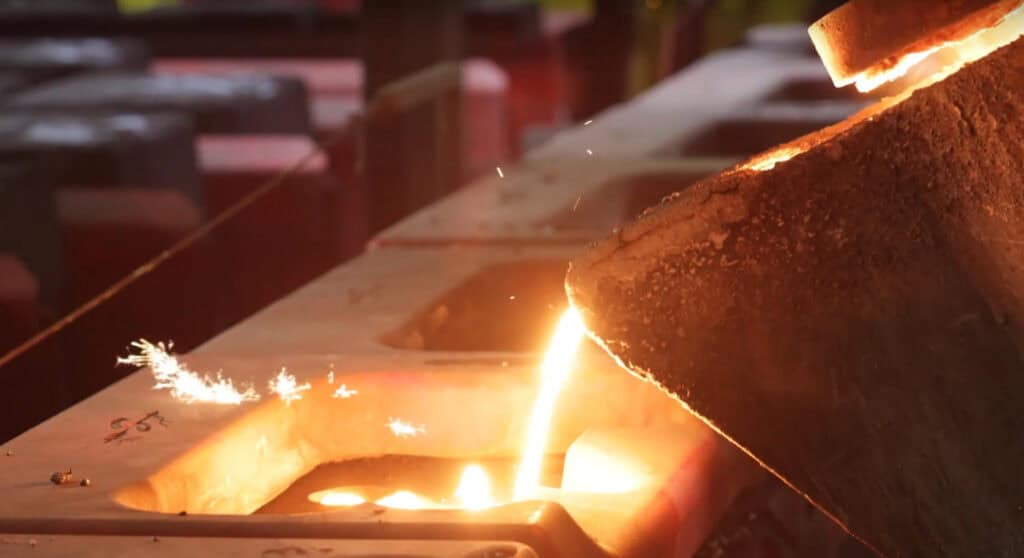Inside look at the complex processes inside a Metal Foundry
How a Metal Foundry Adds To Sustainable Metal Production Practices
Metal foundries play an essential duty in promoting sustainability within the metal manufacturing industry. By integrating recycled products, they reduce reliance on virgin resources and minimize ecological influences. Energy-efficient melting processes even more lessen power intake and emissions. The trip towards sustainable methods includes more than just reusing and power administration. It incorporates a more comprehensive commitment to ethical sourcing and innovative modern technologies. The implications of these practices are considerable and warrant better exam.
The Duty of Recycling in Metal Foundries
While metal manufacturing has actually traditionally relied on virgin materials, the raising focus on sustainability has actually brought about a substantial change in techniques, specifically in metal foundries. Recycling has actually arised as an essential part of this transformation, permitting foundries to repurpose scrap metal and minimize dependence on extracted resources. By incorporating recycled materials right into their processes, foundries not only decrease ecological effect yet also lower manufacturing costs.
The use of recycled steels, such as copper, steel, and aluminum, decreases energy intake and lowers greenhouse gas discharges related to traditional mining and refining techniques. Foundries can attain top quality outputs by employing innovative sorting and handling technologies to guarantee the pureness of recycled materials. This emphasis on reusing fosters a round economy, where waste is decreased, and sources are used efficiently. Metal foundries play a crucial duty in promoting sustainable methods within the metal manufacturing market.
Energy-Efficient Melting Strategies
Energy-efficient melting strategies are necessary for boosting sustainability in metal production. These strategies significantly minimize energy consumption throughout the melting procedure, which is one of the most energy-intensive stages in metal manufacturing. Technologies such as induction melting, resistance heating, and microwave melting deal boosted effectiveness compared to typical methods. Induction melting, as an example, utilizes magnetic fields to create heat directly within the metal, reducing energy loss and supplying specific temperature control.
Additionally, carrying out warmth recuperation systems can better enhance performance by recording and reusing waste heat created during melting. Utilizing sophisticated insulation products and maximizing heater styles likewise add to energy financial savings. By adopting these innovative melting methods, metal foundries can lower their carbon impact, reduce operational expenses, and contribute to a more sustainable manufacturing landscape. The assimilation of energy-efficient techniques not only aligns with environmental objectives however likewise satisfies the expanding need for accountable production methods in the metal industry.
Lasting Sourcing of Raw Products
Sustainable sourcing of resources is necessary for decreasing the ecological impact of metal manufacturing. This entails the raised use of recycled metals, the adoption of moral mining methods, and initiatives aimed at neighborhood sourcing. By prioritizing these methods, the market can promote liable source administration and support regional economic climates.

Recycled Metal Application
Exactly how can sectors successfully reduce their ecological effect while satisfying the expanding need for metal? One significant method is the use of recycled metal. By integrating scrap metal right into their production processes, foundries can reduce the removal of virgin products, thereby lowering and conserving natural sources power consumption. Recycled metals need much less power to process compared to their raw equivalents, leading to lower greenhouse gas discharges. In addition, using recycled metal assists draw away waste from garbage dumps, advertising a round economic climate. Industries that focus on recycled metal not just add to sustainability however likewise gain from expense financial savings related to minimized material procurement. Recycled metal utilization stands as a vital method for ecologically accountable metal production.
Ethical Mining Practices
While the need for steels remains to increase, markets are progressively acknowledging the value of honest mining practices in making certain responsible sourcing of basic materials. Moral mining incorporates a commitment to ecological stewardship, social responsibility, and adherence to reasonable labor techniques. Business are now prioritizing partnerships with mines that show openness in their procedures, decreasing eco-friendly influence and valuing regional neighborhoods. This approach not only fosters a lasting supply chain but likewise boosts the online reputation of organizations included. By executing rigorous criteria and accreditations, markets can combat prohibited mining activities and promote the well-being of employees. Eventually, ethical mining techniques contribute noticeably to a more lasting metal production ecological community, lining up financial development with social and environmental honesty.
Local Sourcing Efforts

Developments in Metal Casting Processes
Innovations in metal casting processes are changing the industry by incorporating advanced recycling strategies that decrease waste. Energy-efficient melting approaches are likewise being established to decrease energy intake throughout manufacturing. Furthermore, the use of ingenious mold products adds to enhanced efficiency and sustainability in casting operations.
Advanced Recycling Techniques
Advanced recycling strategies are changing metal casting processes, considerably improving sustainability in the industry. These innovations concentrate on recycling and redeeming scrap metal, substantially minimizing waste and the need for virgin products. Techniques such as hydrometallurgy and pyrometallurgy make it possible for foundries to remove important steels from utilized parts, making certain effective resource application. Additionally, progressed sorting and filtration innovations enhance the high quality of recycled metals, making them appropriate for high-performance applications. This not just lessens the environmental impact of metal manufacturing yet also fosters a round economic situation by promoting the reuse of products. As these recycling approaches continue to develop, they promise to better streamline procedures within over at this website foundries and add to a much more lasting metal manufacturing landscape.
Energy-Efficient Melting Methods
While traditional melting methods have actually long been the backbone of metal casting, recent advancements have presented energy-efficient methods that considerably minimize energy intake and exhausts. Technologies such as induction melting and electrical arc furnaces have actually acquired prominence, enabling for exact control over temperature level and lowering the requirement for nonrenewable fuel sources. These techniques not just improve energy efficiency however also advertise quicker melting times, which converts to lower operational expenses. In addition, advancements in warmth healing systems allow foundries to capture and recycle excess heat generated throughout the melting procedure. This alternative approach to power administration not just sustains sustainable techniques but also positions metal foundries as leaders in the shift in the direction of greener production processes, better aligning with global sustainability goals.
Cutting-edge Mold Products
As the need for even more sustainable and effective metal casting processes expands, the expedition of cutting-edge mold important site and mildew products has ended up being a focal point in the industry. Traditional mold and mildew products frequently add to ecological obstacles, motivating the search for alternatives that reduce waste and energy consumption. Current advancements include the advancement of recyclable compounds and eco-friendly binders, which not just improve mold efficiency however also decrease environmental effect. Additionally, making use of 3D printing modern technology in mold and mildew creation permits elaborate layouts that reduce material use and allow rapid prototyping. These innovative materials not just improve casting accuracy however also line up with sustainability goals, showcasing the sector's commitment to minimizing its carbon footprint while preserving premium production requirements.
Reducing Waste With Advanced Innovation
Ingenious modern technologies are changing the metal production sector by greatly lowering waste and improving performance. Advanced information analytics and machine knowing formulas enable foundries to maximize production processes, minimizing and recognizing inadequacies scrap material. Smart sensing units monitor devices performance in real-time, enabling predictive maintenance that reduces downtime and waste generation. Additionally, additive manufacturing methods, such as 3D printing, allow for the production of facility parts with minimal material usage, significantly reducing waste contrasted to standard techniques.
Closed-loop systems are ending up being much more widespread, where scrap metal and by-products are reused back right into the manufacturing cycle, ensuring that products are made use of to their max potential. This integration of technology not only advertises resource conservation yet likewise enhances the total sustainability of metal production techniques. By embracing these improvements, foundries can add to a more lasting future while keeping competition in the marketplace
The Effect of Foundries on Carbon Impact Decrease
Foundries play a necessary function in minimizing the carbon impact of the metal production industry by executing various lasting practices. By using energy-efficient modern technologies, such as electrical arc furnaces, these centers significantly lower greenhouse gas emissions compared to traditional methods. Furthermore, foundries increasingly adopt eco-friendly power sources, which also lessens their reliance on fossil gas.
Reusing scrap metal is an additional critical technique that foundries employ, conserving resources and decreasing the need for virgin products. This not just reduces waste yet additionally lowers the energy-intensive removal processes related to mining. Furthermore, the adoption of closed-loop water supply helps to lessen water usage and minimize wastewater discharge, adding to a more sustainable operation.
Through these initiatives, foundries demonstrate their commitment to environmental stewardship, leading to a marked reduction in the total carbon impact of the metal manufacturing industry. Their ongoing efforts are pivotal in the shift toward an extra sustainable commercial landscape.
Often Asked Questions
What Sorts of Metals Are Many Frequently Recycled in Foundries?
Aluminum, copper, brass, and steel are amongst one of the most frequently recycled steels in foundries. These metals are favored as a result of their high recycling prices, economic worth, and extensive accessibility, contributing substantially to commercial sustainability initiatives.
Just How Do Foundries Make Certain the Quality of Recycled Materials?
Foundries establish the top quality of recycled materials via rigorous testing, sorting, and filtration processes. They apply advanced innovations to analyze composition and eliminate impurities, assuring that the recycled steels satisfy industry criteria for performance and safety.
What Certifications Exist for Lasting Foundry Practices?
Numerous certifications More Help exist for lasting foundry methods, consisting of ISO 14001 for environmental management, ISO 50001 for energy management, and LEED certification for lasting structure practices (Aluminum Foundry). These accreditations aid ensure adherence to ecological and sustainability criteria in procedures
Exactly How Do Foundries Gauge Their Carbon Impact Decrease?
Foundries determine carbon impact decrease with tools like lifecycle analyses, energy audits, and discharges tracking systems. They contrast standard exhausts to current outputs, evaluating improvements in energy effectiveness, product usage, and sustainable energy fostering gradually.
What Are the Economic Benefits of Sustainable Metal Production?
Sustainable metal manufacturing supplies economic benefits such as minimized functional prices, increased efficiency, enhanced market competitiveness, and potential federal government rewards. Additionally, it fosters innovation and draws in eco conscious customers, ultimately driving long-term success for companies.
Metal foundries play a crucial duty in promoting sustainability within the metal manufacturing industry. While metal production has actually typically depended on virgin materials, the raising focus on sustainability has actually led to a substantial shift in practices, specifically in metal foundries. By integrating scrap metal into their manufacturing processes, foundries can decrease the removal of virgin products, therefore saving natural resources and lowering energy usage. Foundries play a crucial duty in minimizing the carbon footprint of the metal production market by carrying out different lasting techniques. Reusing scrap metal is an additional critical method that foundries employ, conserving sources and lowering the demand for virgin products.